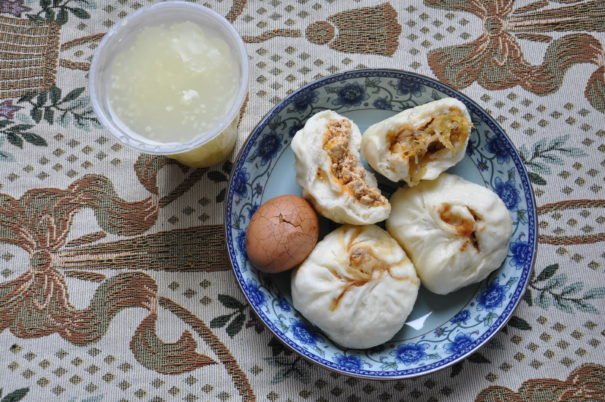
Battling the Numbing Chill of Abstraction, One Breakfast at a Time

Battling the Numbing Chill of Abstraction, One Breakfast at a Time
Baozi in Beijing
For a city like Beijing, whose fame and significance can only grow, its western part has maintained a posture of ease and cool-headedness. Whereas eastern Beijing is now carpeted with post-modern architecture, expat-run bars and restaurants, and the flow of bankers and businessmen, the western part of the city remains largely the same as it was before China opened its doors in 1979. Here, military compounds are scattered about and government buildings stand next to each other; together, they house people who make perhaps the most important decisions in this giant nation.
A radio-show host myself, working for the country’s national broadcaster, I live in western Beijing on a quiet block. Every weekday, my morning starts in a small vegetable market opposite my apartment block among cries of vendors and the steady bargaining voices of grey-haired couples. These elderly couples, whose middle-aged children often struggle for balance between family and a rising career, come to help with daily chores.
Hasty as my weekday morning is, I take pleasure in breakfasting from a family vendor at the market that sells baozi, or steamed buns with fillings. Making the food in a small room behind their food stand, the family provides fresh baozi that are so popular that people sometimes have to wait for the next batch to be taken from the stove, surrounded by steam and mist.
Different from the traditional salted fillings such as meat, tofu or vegetables that I grow up with, this vendor expands my baozi palate: there’s minced a red-bean filling that is sweet, and a seasoned vegetable filling that can be spicy. All the different fillings come together perfectly with the soft and spongy bun.
They come presented with other refreshments as well: eggs boiled with salted tea leaves, or porridge, among others. Together, they wake me up for a rather intense newsroom day.
There are times I exchange small talk with the family. Over time, I learned that they are originally from the big agricultural Henan province in central China. It’s been thirteen years since they rented out their farmland and came to Beijing for their share of China’s economic boom. The owner, a man in his fifties with a coarse but welcoming voice, is the most talkative person in the family.
Just this past week, I noticed they had hired new staff. When I asked the family about it, they told me that business is booming and they are arranging two working shifts to handle everything. There’s a degree of comfort and warmth to me in these short conversations: their story is familiar to me as someone who also migrated from a rural home to the big city, not knowing how the future would look. Sometimes on my show, when we report abstract statistics about urbanization in China, I think about those morning conversations in the vegetable market.